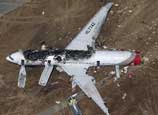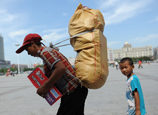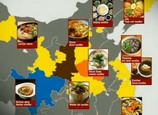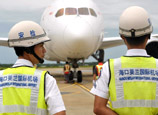
WELLINGTON, July 8 (Xinhua) -- The New Zealand government was urged Monday to reverse its deregulation of the meat processing industry after meat exports to China were blocked for the second time this year.
The main opposition Labor Party suggested the government was lacking "the confidence of Chinese authorities" after container- loads of New Zealand meat were stopped at Dalian, a port city in northeast China, because they lacked proper certification.
Primary Industries Minister Nathan Guy and Food Safety Minister Nikki Kaye said Saturday that they had only become aware two days previously of new Chinese rules requiring veterinarians to be directly linked to the last site the meat was at before export.
Guy, who is currently on an official visit to China, said the New Zealand and Chinese governments had "a warm and professional relationship" that enabled New Zealand officials to quickly resolve the issue.
"We have a very successful trading relationship underpinned by the free trade agreement. No other country is ahead of us in terms of meat access into China," he said in a statement.
Officials were working on a new process of certification that addressed consignments en-route to China and "a pragmatic solution " to enable current consignments to be cleared, Kaye said in the statement.
Chinese meat officials would be in New Zealand next week to progress the comprehensive new meat access arrangements for the future.
The new rules came into force Monday, involving 1,323 consignments, or an estimated 30,000 tonnes of meat, that had already left New Zealand.
Labor primary industries spokesperson Damien O'Connor said the "lag in communication" between Chinese authorities and government ministers could have serious ramifications for New Zealand's meat industry.
"If the Chinese require the veterinarian certification of all meat, the government may have to reverse its program of deregulation for meat inspection in freezing works across the country," O'Connor said in a statement.
"How many new certification processes can the industry expect this year and what can the industry expect from new meat access negotiations due to be discussed by officials next week?" asked O' Connor.
"Government ministers have once again given only vague and timid excuses for the latest meat holdup, frustrating those whose business relies on absolute efficiency."
The latest incident comes as the government is tightening regulation of New Zealand infant formula exports amid concerns about products ending up in the Chinese market.
Last month, Kaye asked the Ministry for Primary Industries (MPI) to undertake an audit to identify areas for improvement, including verification, compliance and testing regimes, and to set up a brand register for infant formula manufactured in New Zealand to ensure the integrity of New Zealand branded products in China.
Earlier this month, the New Zealand government announced it would increase the number of agriculture officials based in China to help resolve issues and unsure a smoother trade relationship.
In January, MPI officials came under criticism for the way they handled information on the suspension of the use of pasture treatment chemical dicyandiamide (DCD) after residues were found in dairy products, while in May, New Zealand meat was left sitting on Chinese wharves after MPI officials failed to properly inform Chinese Customs officials about changes in export certification documents.
















 Seasonal migration of Chinese left-behind children
Seasonal migration of Chinese left-behind children


![]()
